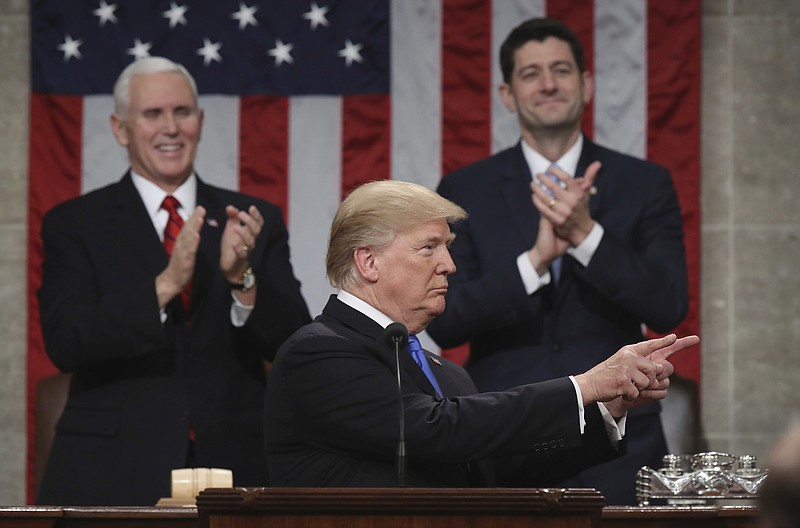SEOUL, South Korea (AP) - President Donald Trump's fiery comments on North Korea reflected confidence that his campaign of pressure and sanctions on the country is working, South Korean analysts said Wednesday.
The experts said it also means Washington will continue to deny Pyongyang meaningful dialogue unless it's willing to discuss serious changes to its nuclear weapons program and human rights conditions.
In his first State of the Nation address, Trump warned that North Korea would "very soon" threaten the United States with nuclear-tipped missiles.
He also warned of the dangers from other "rogue regimes," like Iran, terrorist groups, like the Islamic State, and "rivals" like China and Russia "that challenge our interests, our economy and our values." Calling on Congress to lift budgetary caps and boost spending on the military, Trump said that "unmatched power is the surest means of our defense."
Du Hyeogn Cha, a visiting scholar at Seoul's Asan Institute for Policy Studies, said that for North Korea, it has to hurt that Trump declared the country as a regime that cannot co-exist with the founding values of the United States.
"He made it clear that his 'maximum pressure and engagement' policy will continue to be the only way going forward," he said. "It was probably the worst message he could deliver to the North without issuing a direct military threat."
Koh Yu-hwan, a North Korea expert at Seoul's Dongguk University and a security adviser to South Korea's presidential office, says Trump likely saw North Korea's outreach over the Pyeongchang Winter Olympics as a clear sign that pressure and sanctions are working.
In Beijing, China called on the U.S. to drop what it terms a "Cold War mentality and zero-sum ideology."
Foreign Ministry spokeswoman Hua Chuying said that common interests outweigh differences between the sides and the U.S. should view the relationship "correctly."
China's $275 billion trade surplus with the U.S. has been a constant source of tension, alongside their growing rivalry for military supremacy in Asia and accusations of intellectual property theft.
Iranian President Hassan Rouhani said the people of Iran will continue supporting the Islamic Republic despite foreign pressure.
His comments came just hours after Trump said the U.S. stands with the people of Iran against the country's ruling establishment. Rouhani spoke during a visit to the mausoleum of the Ayatollah Ruhollah Khomeini, the founder of the Islamic Republic.
Rouhani said in remarks broadcast by state TV: "The Iranian nation will never give up Imam Khomeini's legacy; Islamism and Republicanism. Return is impossible."
In the Philippines, Defense Secretary Delfin Lorenzana told The Associated Press that it did not really matter that Trump failed to mention U.S. policy on the South China Sea disputes involving China, the Philippines and four other governments, but that Manila would lend its support to fighting terrorism whenever the efforts of the two nations coincide.
"If our efforts against terrorists coincide, well and good, we cooperate," he said. "But in reality, each country will be addressing its own security problems by any legal means at its disposal."
The U.S. deployed surveillance aircraft to help Philippine forces quell an Islamic State group-linked siege in southern Marawi city last year.

